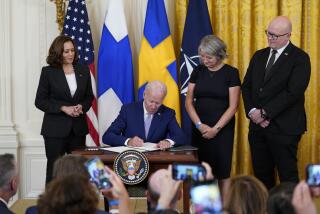Bush to Give Special Trade Role to Baltics : Independence: He plans move to bring the new states into the world economy. They will be added to the most-favored-nation list.
- Share via
WASHINGTON — President Bush announced Wednesday that he will “move quickly” to establish normal economic relations with the newly independent Baltic states by offering them most-favored-nation trading status with the United States.
In a speech to Baltic leaders at the White House, the President also pledged to “help the Baltics to integrate into the world economy” by encouraging their membership in international lending institutions such as the International Monetary Fund, World Bank and the European Bank for Reconstruction and Development.
Deputy Secretary of State Curtis W. Kamman told the Senate Finance Committee that Secretary of State James A. Baker III hopes to come up with “an approach to accomplish this objective” after he meets Saturday with representatives of Estonia, Latvia and Lithuania.
The most-favored-nation designation is a somewhat misleading term that refers to the status the United States extends to almost all its trading partners. The exporters of countries granted that status pay the lowest available tariffs on products shipped to the United States.
Assigning most-favored status to the Baltic states could require congressional action. The republics are still barred from receiving most-favored treatment under 1974 legislation that denies it to any nation without a free-market economy that does not give its citizens the right or opportunity to emigrate. The provision was aimed at pressuring the Soviet Union to ease restrictions that prevented Jews from leaving the country.
Kamman and other senior Administration officials also urged the committee to move ahead on a trade agreement that would extend most-favored status to the Soviet Union.
The agreement had been signed by Bush and Soviet President Mikhail S. Gorbachev in June 1990, but Bush refused to submit it to Congress until the Administration was satisfied that the Soviets had made a substantial improvement in their emigration laws. As a result, it did not reach Capitol Hill until Aug. 2--only weeks before the unsuccessful coup.
“The world has changed dramatically since Aug. 2,” said Senate Finance Chairman Lloyd Bentsen (D-Tex.). “Frankly, I don’t know what that trade agreement means today. But it sure means something different than it did on Aug. 2.”
The changes sweeping the Soviet Union make the agreement more important than ever, despite the current uncertainty over whether central government or republic leaders will chart the country’s future economic course, argued Deputy U.S. Trade Representative Julius Katz.
“The responsibilities of the central and republic governments are being shaped as we speak,” Katz said. “It is important to put into place now a set of obligations to govern our trade relations, which can also serve as a road map for the central and republic governments on the requirements for ensuring a free and open trading system as part of their development of a market economy.”
More to Read
Get the L.A. Times Politics newsletter
Deeply reported insights into legislation, politics and policy from Sacramento, Washington and beyond. In your inbox twice per week.
You may occasionally receive promotional content from the Los Angeles Times.










